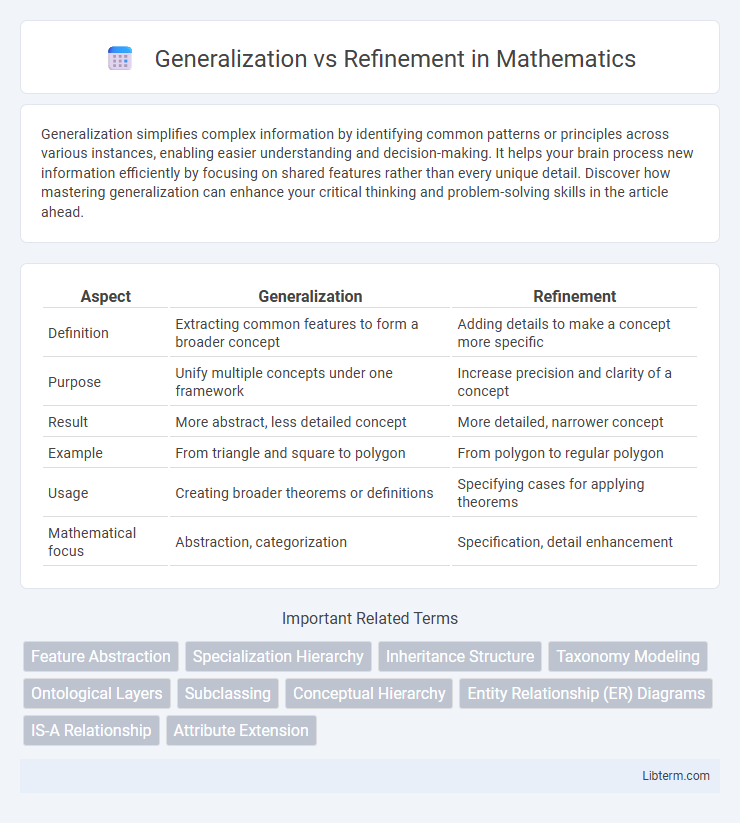Generalization simplifies complex information by identifying common patterns or principles across various instances, enabling easier understanding and decision-making. It helps your brain process new information efficiently by focusing on shared features rather than every unique detail. Discover how mastering generalization can enhance your critical thinking and problem-solving skills in the article ahead.
Table of Comparison
| Aspect | Generalization | Refinement |
|---|---|---|
| Definition | Extracting common features to form a broader concept | Adding details to make a concept more specific |
| Purpose | Unify multiple concepts under one framework | Increase precision and clarity of a concept |
| Result | More abstract, less detailed concept | More detailed, narrower concept |
| Example | From triangle and square to polygon | From polygon to regular polygon |
| Usage | Creating broader theorems or definitions | Specifying cases for applying theorems |
| Mathematical focus | Abstraction, categorization | Specification, detail enhancement |
Understanding Generalization and Refinement
Understanding generalization involves recognizing broad patterns or concepts that apply across multiple instances, allowing the formulation of abstract rules or models. Refinement focuses on enhancing these broad concepts by introducing specific details and nuances, improving accuracy and applicability in particular contexts. Mastery of both processes is essential in fields like machine learning and knowledge representation, where balancing generality and specificity leads to better decision-making and predictive performance.
Key Differences Between Generalization and Refinement
Generalization involves abstracting common features from multiple entities to create a broader, more inclusive superclass, while refinement focuses on adding specific details or constraints to an existing class, producing more specialized subclasses. The key difference lies in the direction of abstraction: generalization moves upward in the hierarchy to simplify and unify concepts, whereas refinement moves downward to enhance precision and detail. In object-oriented design, generalization promotes code reusability by consolidating shared attributes, whereas refinement improves clarity by distinguishing unique characteristics of subclasses.
Importance of Generalization in Concept Development
Generalization plays a crucial role in concept development by enabling the identification of common patterns and principles across diverse instances, which fosters the creation of broad, applicable frameworks. It simplifies complex information, making concepts easier to communicate, understand, and apply in various contexts. This process supports innovation and scalability by allowing ideas to extend beyond specific cases to wider applications.
The Role of Refinement in Problem Solving
Refinement plays a crucial role in problem solving by systematically narrowing down solutions to enhance precision and effectiveness. It involves iterative analysis and adjustment, allowing for the continuous improvement of initial general ideas into more specific, tailored approaches. This process optimizes problem-solving efficiency by focusing on relevant variables and eliminating extraneous elements.
Advantages of Generalization
Generalization enhances model efficiency by reducing complexity through the abstraction of common features across different classes or instances. It improves scalability and flexibility, allowing systems to handle new, unseen data with better accuracy and adaptability. This abstraction minimizes redundancy and fosters knowledge transfer, enabling more robust and maintainable models.
Benefits of Refinement Techniques
Refinement techniques enhance model accuracy by focusing on specific data patterns and reducing overgeneralization errors in machine learning. These methods improve predictive performance by iteratively fine-tuning parameters and incorporating detailed feature representations. As a result, refinement supports robust decision-making and increases the model's adaptability to complex datasets.
When to Use Generalization vs Refinement
Use generalization when simplifying multiple related classes into a broader superclass to capture shared attributes and behaviors, enhancing code reusability and reducing redundancy. Opt for refinement when breaking down a complex class into more specific subclasses to add detailed, specialized features or tailor functionality for distinct use cases. Generalization suits early design stages for abstraction, while refinement is ideal during detailed design for specificity and enhanced clarity.
Common Challenges and Pitfalls
Generalization often risks oversimplification, leading to loss of essential details while refinement may cause overfitting by making models too specific to training data. Common challenges include finding the right balance to maintain model accuracy without sacrificing adaptability or interpretability. Pitfalls include ignoring domain complexity during generalization and excessive micro-adjustments in refinement that reduce model robustness.
Real-World Examples of Generalization and Refinement
Generalization in machine learning allows models to apply learned patterns to new, unseen data, exemplified by spam filters identifying new types of spam emails beyond their training set. Refinement involves iteratively improving models by fine-tuning parameters or adding features, such as enhancing speech recognition systems to better understand diverse accents. In real-world applications, autonomous vehicles generalize from diverse driving data to operate safely in unfamiliar environments, while continuous refinement optimizes sensor integration and decision-making algorithms for improved accuracy.
Best Practices for Balancing Both Approaches
Balancing generalization and refinement in software design requires focusing on reusable components while ensuring they remain adaptable to specific use cases. Best practices involve implementing modular architectures with clear abstractions allowing for extension without modifying core modules. Regularly refactoring and validating components against real-world requirements maintains the optimal balance between flexibility and performance.
Generalization Infographic

 libterm.com
libterm.com